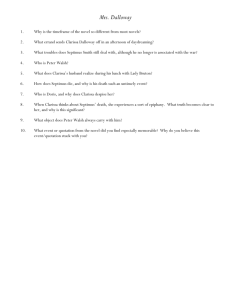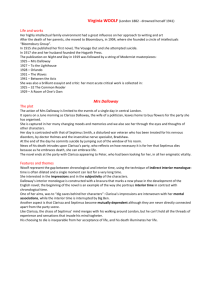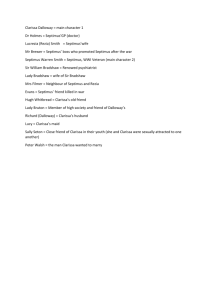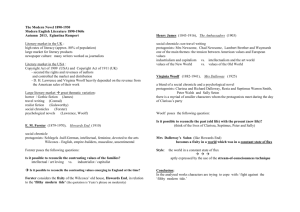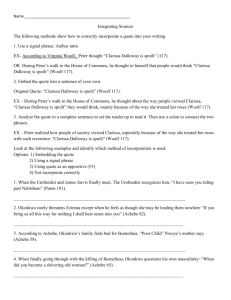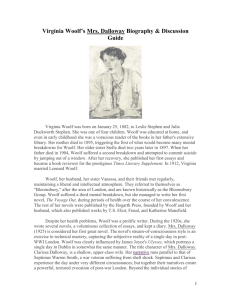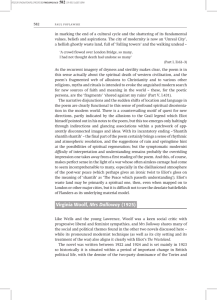Human sacrifice in Mrs. Dalloway
advertisement
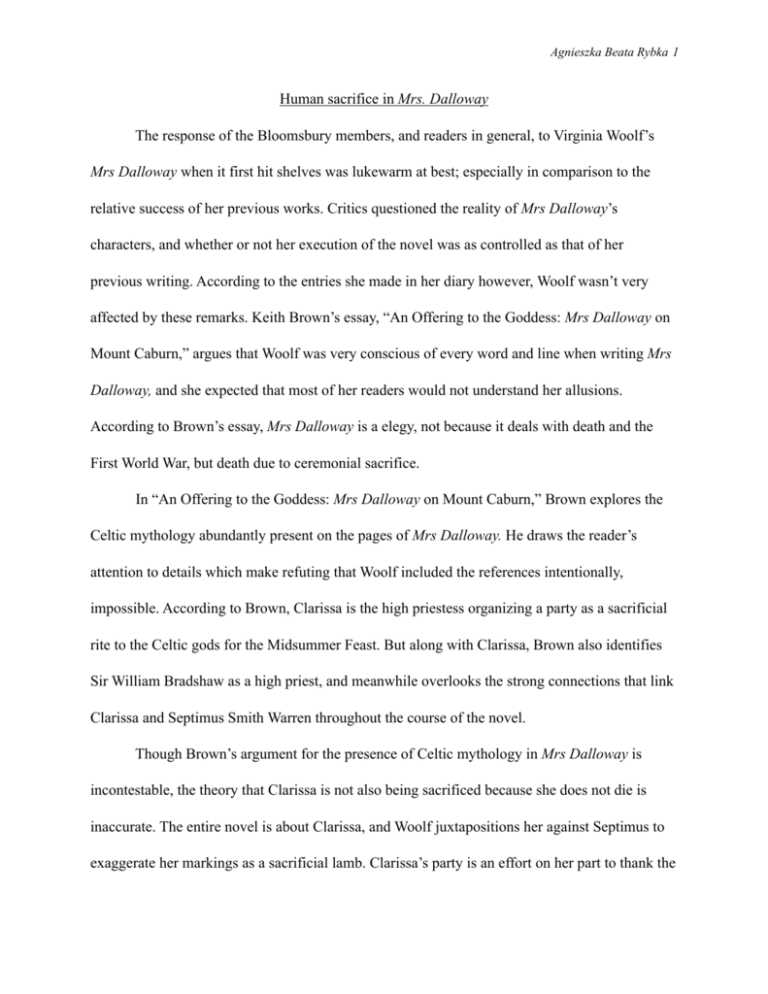
Agnieszka Beata Rybka 1 Human sacrifice in Mrs. Dalloway The response of the Bloomsbury members, and readers in general, to Virginia Woolf’s Mrs Dalloway when it first hit shelves was lukewarm at best; especially in comparison to the relative success of her previous works. Critics questioned the reality of Mrs Dalloway’s characters, and whether or not her execution of the novel was as controlled as that of her previous writing. According to the entries she made in her diary however, Woolf wasn’t very affected by these remarks. Keith Brown’s essay, “An Offering to the Goddess: Mrs Dalloway on Mount Caburn,” argues that Woolf was very conscious of every word and line when writing Mrs Dalloway, and she expected that most of her readers would not understand her allusions. According to Brown’s essay, Mrs Dalloway is a elegy, not because it deals with death and the First World War, but death due to ceremonial sacrifice. In “An Offering to the Goddess: Mrs Dalloway on Mount Caburn,” Brown explores the Celtic mythology abundantly present on the pages of Mrs Dalloway. He draws the reader’s attention to details which make refuting that Woolf included the references intentionally, impossible. According to Brown, Clarissa is the high priestess organizing a party as a sacrificial rite to the Celtic gods for the Midsummer Feast. But along with Clarissa, Brown also identifies Sir William Bradshaw as a high priest, and meanwhile overlooks the strong connections that link Clarissa and Septimus Smith Warren throughout the course of the novel. Though Brown’s argument for the presence of Celtic mythology in Mrs Dalloway is incontestable, the theory that Clarissa is not also being sacrificed because she does not die is inaccurate. The entire novel is about Clarissa, and Woolf juxtapositions her against Septimus to exaggerate her markings as a sacrificial lamb. Clarissa’s party is an effort on her part to thank the Agnieszka Beata Rybka 2 gods for England’s victory in World War I, and throughout the novel Woolf almost convinces the reader to expect Clarissa to die. The relief that she feels when she learns of Septimus’ suicide is not just relief of a duty fulfilled, but a release from the commitment of sacrificing her own life. According to Brown’s research, there is no question as to Clarissa’s party being anything other than a Midsummer Festival. Woolf informs us that the party takes place on a Wednesday in June 1923, which, as Brown points out, could have been June 20th, 1923; the exact date of the summer solstice, preceding St. John’s Eve, which falls on June 23rd, by only a few days. The Celts worshipped their Great Queen god at summer solstice to ensure good harvests, good health and fertility, and success in battle in times of war: But for such gifts the divine powers claim sacrifice - in Wales, traditions survived till modern times of lakes and rivers from which voices cry that “the hour is come but the man is not” - and society must play its own part, its priests or priestesses keeping up the communal fertility/solar festivals, of which the Midsummer Festival is the greatest. (Brown 14) This view of Clarissa’s party as a Midsummer celebration and offering to the gods in gratitude for England’s victory in World War I, is completely sensible, especially considering the great losses that England had suffered in World War I. And it’s only natural that Clarissa would take this responsibility unto herself because of the envious concern with which she perceives the sacrifices that other women have made. She greatly admires Lady Bexborough “who opened a bazaar, they said, with the telegram in her hand, John, her favourite, killed.” (Woolf 5) Clarissa feels the need to be responsible for a sacrifice as well. In “An Offering to the Goddess,” Brown specifies that the human sacrifices mostly consisted of criminals and the condemned kept captive, and who even underwent a special presacrificial ritual: Agnieszka Beata Rybka 3 The distinctively Celtic form of human offering was death by impalement -- sometimes, though not necessarily, in the groves that served the Celts for temples -- the victim being preferably a condemned criminal, first held prisoners for a ritual period of five years. […] In fact it is just five years since Septimus began to feel those sudden “thunderclaps of fear”, five years since he became a prisoner, cut off from humanity by his incapacity to feel. At noon on the day of his death he formally identifies himself as the Man by announcing to the High Priest of the Sacrifice (for Sir William Bradshaw serves a goddess, we are told, who “loves blood”) that he is a condemned criminal. Precisely six hours later […] he is impaled on the spears of Mrs. Filmer’s area railings. By sunset, at the latest, he is dead. That he has previously felt a compulsion to drown himself in the Thames, and suffers terrifying delusions of falling into flames, only serves -- or might be though to serve -- to complete his identification as the Celtic sacrificial victim. (Brown 14) Septimus meets every one of the Celtic requirements for the ritual of human sacrifice. He feels trapped in society, even by the confines of his marriage, because he can’t feel. He views himself as a criminal because of an inexplicable transgression against his friend, Evans. He is even referred to actual confinement in a home in the countryside by Sir Bradshaw as a form of treatment; or as a form of imprisonment. He randomly suffers from the delusion that he’s falling into flames while lying on the sofa. And finally, he ends his life by jumping out a window and being pierced by a spiked fence surrounding Mrs. Filmer’s property. Septimus’ preparation for sacrificing himself is obvious. Meanwhile, Clarissa has the same qualifications, they’re just more subtle. Apart from dying, Clarissa possesses and displays every characteristic which designates Septimus as the sacrifice. She feels trapped by the confines of her marriage, constantly questioning whether she should have married Peter Walsh: All in a clap it came over her, If I had married him, this gaiety would have been mine all day! It was all over for her. The sheet was stretched and the bed narrow. She had gone up into the tower alone and left them blackberrying in the sun. The door had shut, and there among the dust of fallen plaster and the litter of birds’ nests how distant the view had looked, and the the sounds came thin and chill (once on Leith Hill, she remembered), and Richard, Richard! she cried, as a sleeper in the night starts and stretches a hand in the Agnieszka Beata Rybka 4 dark for help. Lunching with Lady Bruton, it came back to her. He has left me; I am alone for ever. (Woolf 47) Clarissa feels that if she had not married Richard then she wouldn’t be exiled in what she perceives as a prisoner tower with a narrow bed for herself; “Narrower and narrower would her bed be.” (Woolf 31) The description of her lodgings sounds like a small prisoner cell. She feels that Richard has abandoned her and she is deserted. Furthermore, we learn in another reference to her lonely chambers, that they’re a result of Clarissa’s fragile health, which similarly to Septimus, resulted in temporary confinement and afterwards Richard’s insistence that she sleep in the attic to rest undisturbed. Even more similarly to Septimus, Clarissa too suffers from burning sensations: “Why, after all, did she do these things? Why seek pinnacles and stand drenched in fire? Might it consume her anyhow! Burn her to cinders!” (Woolf 167) “Always her body went through it first, when she was told, suddenly, of an accident; her dress flamed, her body burnt.” (Woolf 184) And she too, considers plunging out of windows: “What a lark! What a plunge! For so it had always seemed to her, when, with a little squeak of the hinges, which she could hear now, she had burst open the French windows and plunged at Bourton into the open air.” (Woolf 3) No, she does not actually jump, but it’s certainly no coincidence that Woolf chose to include the imagery in the opening paragraphs of the novel and set it against the closing images; especially when she herself once unsuccessfully attempted suicide by jumping out of a window. The connection between Clarissa being an even stronger candidate for oblation to the Midsummer gods than Septimus comes from Clarissa herself: Her parties! That was it! Her parties! Both of them criticised her very unfairly, laughed at her very unjustly, for her parties. That was it! That was it! Well, how was she going to defend herself? Now that she knew what it was, she felt perfectly happy. They thought, or Agnieszka Beata Rybka 5 Peter at any rate thought, that she enjoyed imposing herself; liked to have famous people about her; great names; was simply a snob in short. Well, Peter might think so. Richard merely thought it foolish of her to like excitement when she knew it was bad for her heart. It was childish, he thought. And both were quite wrong. What she liked was simply life. “That’s what I do it for,” she said, speaking aloud, to life. Since she was lying on the sofa, cloistered, exempt, the presence of this thing which she felt to be so obvious, became physically existent. […] But suppose Peter said to her, “Yes, yes, but your parties -- what’s the sense of your parties?” all she could say was (and nobody could be expected to understand): They’re an offering; which sounded horribly vague. […] But could any man understand what she meant either? about life? She could not imagine Peter or Richard taking the trouble to give a party for no reason whatever. But to go deeper, beneath what people said (and these judgements, how superficial, how fragmentary they are!) in her own mind now, what did it mean to her, this thing she called life? Oh, it was very queer. Here was So-and-so in South Kensington; some on up in Bayswater; and somebody else, say, in Mayfair. And she felt quite continuously a sense of their existence; and she felt what a waste; and she felt what a pity; and she felt if only they could be brought together; so she did it. And it was an offering; to combine, to create; but to whom? An offering for the sake of offering, perhaps. Anyhow, it was her gift. (Woolf 121-122) Clarissa feels offended by the insensitivity of Peter and Richard to her parties because they’re her way of making an offering to the gods. She feels that she is her parties, and therefore, she is sacrificing herself by organizing them. Peter thinks that her parties cause her pleasure and Richard realizes they’re bad for her health because they actually could potentially be an opportunity for her to die. Clarissa has her parties hoping that they’re enough so that she doesn’t have to completely expire to fulfill her obligations to the gods. Her parties are her offering, she fears having to die as a sacrificial lamb. Because of Clarissa’s description of her party as an offering, Brown has automatically assigned her to the role of high priestess, “at once the perfect hostess and Priestess of the communal rites.” (Brown 14) He also assigns the role of High Priest to Sir William Bradshaw. What he misses is the resentment and wariness that Clarissa feels towards Bradshaw which makes it impossible that she should make an offering with him. Especially when her dislike for Agnieszka Beata Rybka 6 him most likely stems from her own associations of herself as a victim of men like him; she senses that if he could, he would sacrifice her like he sacrificed Septimus: There were the Bradshaws, whom she disliked. […] He was talking to Richard about the Bill probably, which they wanted to get through the Commons. Why did the sight of him, talking to Richard, curl her up? He looked what he was, a great doctor. A man absolutely at the head of his profession, very powerful, rather worn. For think what cases came before him -- people in the uttermost depths of misery; people on the verge of insanity; husbands and wives. He had to decide questions of appalling difficulty. Yet -- what she felt was, one wouldn’t like Sir William to see one unhappy. No; not that man. […] She had once gone with some one to ask his advice. He had been perfectly right; extremely sensible. But Heavens -- what a relief to get out to the street again! There was some poor wretch sobbing, she remembered, in the waiting-room. But she did not know what it was -- about Sir William; what exactly she disliked. Only Richard agreed with her, “didn’t like his taste, didn’t like his smell.” (Woolf 182-183) Clarissa and Richard both dislike Sir William Bradshaw. Clarissa, in particular, recalls an experience she had during a consultation with him once, and fears that if Sir William senses one’s unhappiness, or depression, there may follow some unpleasant consequences. Basically, she fears that if Sir William were to discover her depression, for it’s unclear whether it was that or influenza that was her specific “illness” throughout the novel, he may want to send her into confinement; he may want to make a prisoner and then a sacrifice of her. We also don’t know what advice Clarissa was seeking of him and with whom, so it’s not certain whether it was advice for herself that she sought. Either way, Clarissa fears him. And Richard agrees with her. His response is also one that can be read as a bit cannibalistic; he’s concerned with Sir William’s taste and smell, as if he were to consume him instead of allowing him to sacrifice Clarissa. Septimus’ suicide both relieves Clarissa of expecting her own doom, but also confirms her suspicions of Sir William being responsible for death among the weak, “Oh! thought Clarissa, in the middle of my party, here’s death, she thought.” (Woolf 183) And Septimus’ death Agnieszka Beata Rybka 7 is a direct result of Sir William’s presence, though Septimus had urges of taking his own life, his final act was brought on by Sir William, and it was with resistance that he went down: Holmes was coming upstairs. Holmes would burst open the door. Holmes would say “In a funk, eh?” Holmes would get him. But no; not Holmes; not Bradshaw. […] It was their idea of tragedy, not his or Rezia’s (for she was with him). Holmes and Bradshaw like that sort of thing. (He sat on the sill.) But he would wait till the very last moment. He did not want to die. Life was good. The sun hot. Only human beings -- what did they want? (Woolf 149) In reality, Dr. Holmes is the one physically present at the moment that Septimus defenestrates himself. But since the interaction is directly following his and Lucrezia’s discussion of how Septimus would have to go to the country as Sir William advised, Septimus lumps Dr. Holmes and Sir William into one evil force that’s out to get him. Therefore, in his fear of Dr. Holmes approaching, he actually sees Sir William approaching to take him away, to separate him from Lucrezia, the only person who still believes and loves him. As a result, Septimus’ suicide is brought on directly by Sir William, as an act of defiance against his wanting to lock him up. And Clarissa somehow senses this, that’s why she pities Septimus’ death. Clarissa is the only one who understands that Septimus commits suicide as a direct result of Sir William’s interference: But this young man who had killed himself -- had he plunged holding his treasure? “If it were now to die, ‘twere now to be most happy,” she had said to herself once, coming down in white. Or there were the poets and thinkers. Suppose he had that passion, and had gone to Sir William Bradshaw, a great doctor yet to her obscurely evil, without sex or lust, extremely polite to women, but capable of some indescribable outrage -- forcing your soul, that was it -- if this young man had gone to him, and Sir William had impressed him, like that, with his power, might he not then have said (indeed she felt it now), Life is made intolerable; they make life intolerable, men like that? (Woolf 184-185) Clarissa sees Sir William for the evil, human sacrificing man that he is, she knows that Septimus did not want to die, that Sir William made him; Septimus was an unwilling sacrifice. She senses Agnieszka Beata Rybka 8 that Sir William is evil somehow, that he can sense weakness and fear, and that’s why she dislikes him. She fears that one day, perhaps in the following year, he’ll sense her sadness, because he’ll need another sacrifice. And her party won’t be enough. Clarissa fears that Sir William will make sacrifice of her too, she feels the strong parallel between herself and Septimus and acknowledges that their fates could have probably been interchangeable: Then (she had felt it only this morning) there was the terror; the overwhelming incapacity, one’s parents giving it into one’s hands, this life, to be lived to the end, to be walked with serenely; there was in the depths of her heart an awful fear. Even now, quite often if Richard had not been there reading the Times, so that she could crouch like a bird and gradually revive, send roaring up that immeasurable delight, rubbing stick to stick, one thing with another, she must have perished. […] It was due to Richard; she had never been so happy. Nothing could be slow enough; nothing last too long. No pleasure could equal, she though, straightening the chairs, pushing in one book on the shelf, this having done with the triumphs of youth, lost herself in the process of living, to find it, with a shock of delight, as the sun rose, as the day sank. (Woolf 185) Clarissa feels that it’s thanks to Richard that she hasn’t yet met her fate as Septimus did. Richard agrees with her dislike of Sir William, and he protects her from his persecution. The thing that makes Clarissa vulnerable is her “illness,” or more specifically, her tendency towards depression. Richard looks after her health and makes sure to provide her with every comfort she might need, like giving her space in her tower, so that she can recover. And Clarissa needs time to recover and return from being melancholy. Richard provides the protection she needs to not fall prey to Sir William. Richard subconsciously realizes that he could have lost Clarissa. He views their marriage and the fact that she’s a part of his life a miracle: The time comes when it can’t be said; one’s too shy to say it, he thought, pocketing his sixpence or two of change, setting off with his great bunch held against his body to Westminster to say straight out in so many words (whatever she might think of him), Agnieszka Beata Rybka 9 holding out his flowers, “I love you.” Why not? Really it was a miracle thinking of the War, and thousands of poor chaps, with al their lives before them, shovelled together, already half forgotten; it was a miracle. Here he was walking across London to say to Clarissa in so many words that he loved her. Which one never does say, he though. […] Being preserved in his simplicity yet at the same time grown rather speechless, rather stiff -- he repeated that it was a miracle that he should have married Clarissa; a miracle -- his life had been a miracle, he thought. (Woolf 115) Richard recognizes that he used to be jealous of Clarissa’s relationship with Peter Walsh, but he no longer is because in the end Clarissa chose him; and that’s a miracle. It’s a miracle that he did not go off to war and die, and while others did, he got to spend all that time with Clarissa. But, a part of the miracle is also that during all that time, Clarissa didn’t die either, or that neither of them were killed in a sacrificial ceremony or a bombing for that matter. So really, there were more opportunities for Richard and Clarissa not to be together, but because regardless, they were all this time, that’s a miracle. And in a large part, it is thanks to Richard, as her protector. Clarissa should have died at the end of the novel, and her and Richard both know this. The only reason she did not was a result of Septimus’ death which made hers unnecessary. But if Septimus had not succumbed to Sir William’s mental manipulations, Clarissa no doubt would have. So the lines which to Brown imply that Clarissa felt fulfilled and satisfied by Septimus’ death, “There was an embrace in death,” (Woolf 184) instead mean that Clarissa was relieved. Septimus had died and as a result saved her. Works Cited Bell, Quentin. Virginia Woolf: A Biography. N.p.: n.p., n.d. 90. Google Books. Web. 15 Feb. 2011. <http://books.google.com/ books?id=E4RIzqTmSFQC&printsec=frontcover&dq=virginia+woolf +biography&hl=en&ei=mRBaTZWkFoOdlge4_YHdDA&sa=X&oi=book_result&ct=result&res num=1&ved=0CDEQ6AEwAA#v=onepage&q=suicide&f=false>. Agnieszka Beata Rybka 10 Brown, Keith. "An offering tot he goddess: Mrs Dalloway on Mount Calburn." The Times Literary Supplement 18 June 2004: n. pag. Print. Johnson, Roy, dir. "Mrs Dalloway - a study guide." Mantex. Mantex Information Design, 2011. Web. 14 Feb. 2011. <http://www.mantex.co.uk/2010/01/28/mrs-dalloway-a-study-guide/>. Woolf, Virginia. Mrs. Dalloway. N.p.: n.p., n.d. Print. Woolf, Virginia, Francine Prose, and Mark Hussey. "Selected Entries from the Diary of Virginia Woolf." The Mrs. Dalloway Reader. N.p.: n.p., n.d. 97-99. Print.
